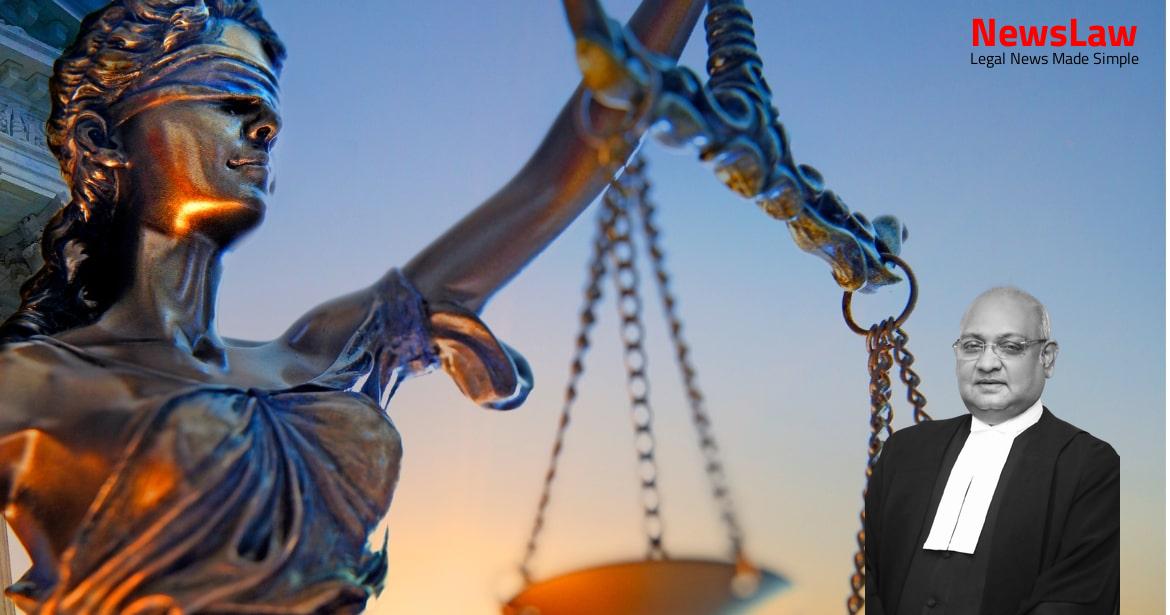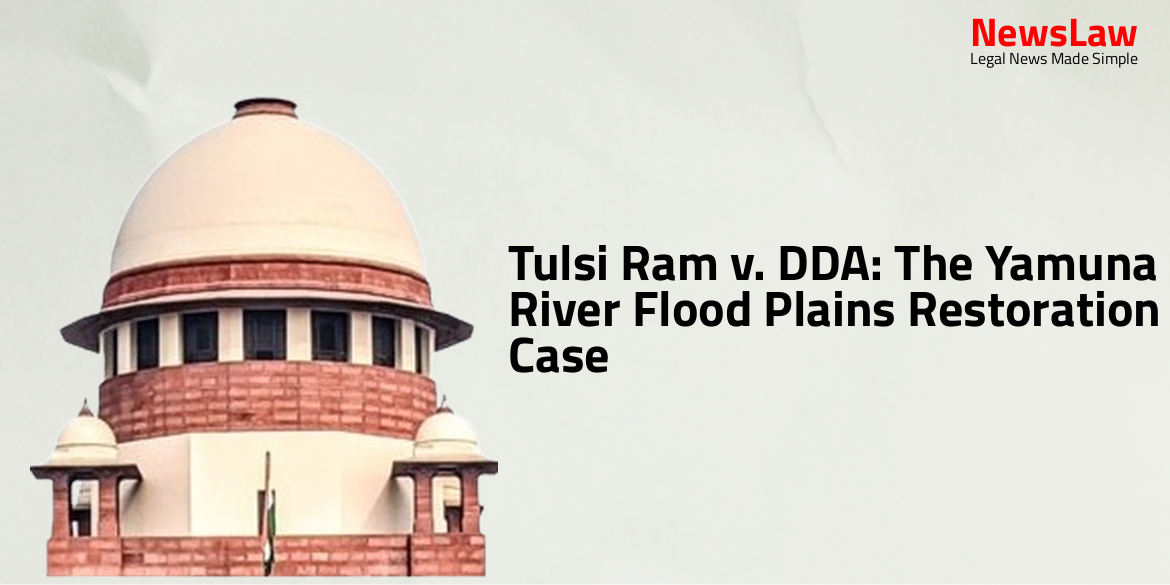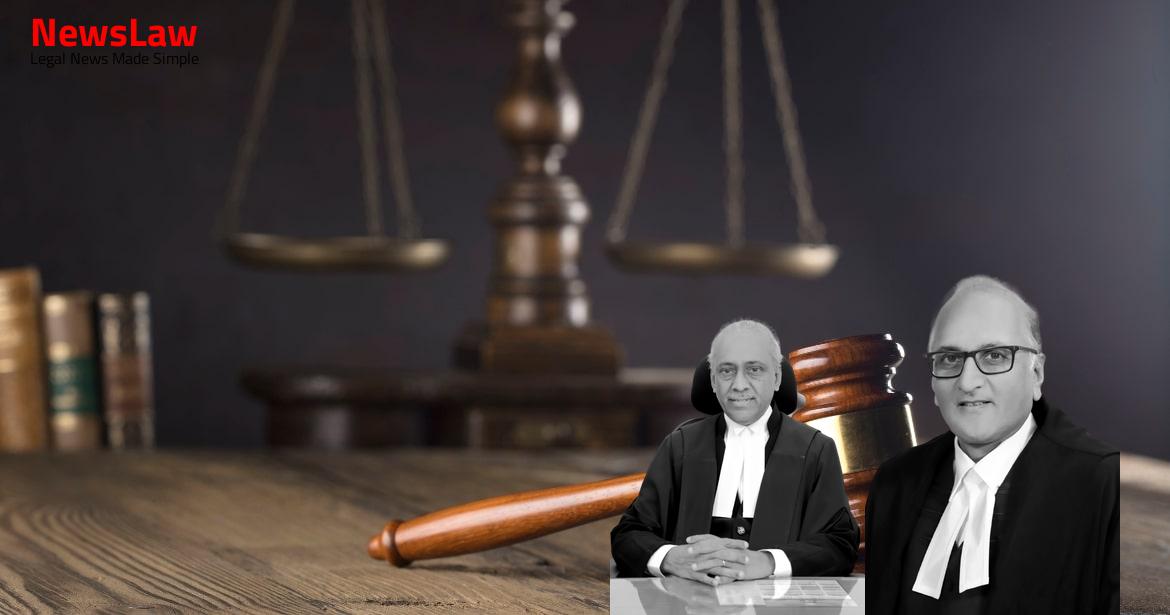In a recent legal case, the court provided in-depth legal analysis on arbitration venue and tribunal composition. The focus was on understanding the nuances of mandatory provisions and party autonomy within arbitration agreements. This analysis sheds light on crucial aspects of arbitration law that are often overlooked. Stay tuned for more insights into this complex legal landscape.
Facts
- The respondent accepted that every Rig hired was as per the agreement.
- Arbitrator accepted the claim by the appellant through ex-parte award.
- Respondent filed an application in Calcutta High Court to set aside the award.
- Various agreements were entered into between the parties for equipment rental.
- A petition under Section 34 of the Act was filed by the respondent in the Court of District Judge, Alipore.
- Claimant approached CIAC for appointment of an arbitrator due to payment dispute.
- Trial Court observed the existence of agreements containing arbitration clause.
- Respondent denied the existence of agreements but did not participate in arbitration.
- Arbitration proceedings were held by a Sole Arbitrator in New Delhi.
- Appellant invoked arbitration for outstanding dues.
- Respondent filed suit declaring agreements null and void.
- High Court dismissed respondent’s petition under Section 34 of the Act.
- Jurisdiction of Section 34 was found to be where the arbitration was done.
- Venue of arbitration was specified in the agreements as New Delhi and Kolkata.
- Appellate Court dismissed appeals challenging the arbitration and award.
- Arbitration was conducted by a sole arbitrator assigned by CIAC.
- Stamp paper was deposited for pronouncing the award.
- Multiple appeals and applications were filed regarding the arbitration process.
- Appellate Court affirmed the validity of the arbitration and award.
- The respondent initially challenged the Order dated 13.08.2018 by filing Revision Petition (C.O. No.3400 of 2018) which was dismissed as not being maintainable by the High Court at Calcutta.
- The High Court at Calcutta reserved the rights of the respondent to agitate all the issues within the ambit of Section 34 of the Act in the proceedings pending before the Court at Alipore.
- Special Leave Petition (Civil) Nos.25279-25280 of 2017 arising from the Revision Petitions were dismissed by the Court on 06.10.2017.
- The petition filed by the respondent under Section 34 of the Act, viz. Miscellaneous Case No.298 of 2015, was dismissed by the Court at Alipore on 13.08.2018.
- The Single Judge of the Calcutta High Court set aside the award on 17-11-1998, stating that the dismissal would not have any bearing on the decision that may be rendered in the pending petition under Section 34 of the Act before the Court at Alipore.
Also Read: Legal Analysis on Arbitration Petition Limitation Period
Issue
- Respondent did not raise objections before the Arbitrator during the proceedings
- Arbitral proceedings concluded with an ex-parte award
- Question of whether the respondent waived the right to raise objections arises
- High Court judgment is currently being challenged
- Four agreements provided for arbitration but resulted in a common award
- Venue stated in one agreement was Kolkata but proceedings were conducted in Delhi
Also Read: Analysis of High Courts’ Jurisdiction and Court Orders Under Article 142
Arguments
- Agreement with arbitration clause at Kolkata challenged as invalid due to arbitration taking place in New Delhi.
- Opposite party claims multiple agreements with arbitration clause mentioning Delhi as arbitration venue.
- Jurisdictional issue raised with petitioner filing petition under Section 34 at the wrong court.
- Court determines that New Delhi has jurisdiction due to arbitration award being passed there.
- Even number of arbitrators deemed invalid as per Section 10 of the Arbitration and Conciliation Act.
- Argument made by Mr. Venugopal that Section 10 is a mandatory provision that cannot be ignored.
- Composition of Arbitral Tribunal believed to be invalid, rendering proceedings and awards unenforceable.
- Need for compliance with arbitration agreement requirements highlighted by Section 4 of the Act.
- Agreement allowing even number of arbitrators considered contrary to mandatory provisions of the Act.
- Respondent denied existence of agreements initially
- Civil Court accepted application under Sections 5 and 8 of the Act based on original agreements
- Respondent did not participate in arbitration proceedings
- Objection raised about venue of arbitration during Section 34 petition stage
- Arbitrator appointed through CIAA as per agreement
- Argument made for respecting party autonomy regarding venue specified in the agreement
- Relied on Duro Felguera, S.A. vs Gangavaram Port Limited with multiple arbitral agreements
- Relevant provisions of Sections 4, 16, and 20 of the Act discussed
- Highlight on waiver of right to object and competence of arbitral tribunal on jurisdiction
- Assertion that certain provisions are non-derogable and cannot be waived
- Claim that respondent waived objection by not raising it earlier
- Categorization of provisions from which a party can or cannot derogate mentioned
Also Read: Electoral Malpractices in Mayor Election
Analysis
- Section 10 needs to be read along with Section 16 and is considered a derogable provision.
- Respondents deemed to have waived their right to object to the composition of the Arbitral Tribunal as per Section 16.
- Stipulation in Section 10 that the number of Arbitrators shall not be an even number found to be derogable.
- In Duro Felguera case, the request for composite reference to arbitration covering multiple contracts was not accepted by the Court.
- The applicable substantive and curial law would be the same in the present case.
- Challenge under Section 16(2) should be raised not later than the submission of the statement of defence.
- The respondent could have submitted separate arbitration proceedings for each agreement but failed to do so.
- The matter had arisen from an arbitration petition under Section 11(6) of the Act.
- All the disputes covered by arbitration clause to be adjudicated by the arbitrator.
- Respondent deemed to have waived objections by not participating in proceedings before the Arbitrator.
- Disputes regarding payments fall within the scope of the arbitration clause.
- Section 16(2) allows a party to challenge the composition of the Arbitral Tribunal even if the party participated in appointing the arbitrator.
- A party is free to choose whether or not to raise such a challenge.
- Section 10 and 16 together show that objections to the composition of the Arbitral Tribunal are derogable.
- Derogable because a party can choose not to object within the prescribed time, leading to deemed waiver under Section 4.
- Section 10 is not a non-derogable provision.
- Arbitration is dependent on an arbitration agreement in writing between parties
- Arbitral Tribunal has the authority to rule on its own jurisdiction under Section 16
- Arbitral Tribunal can rule on any objection regarding the existence or validity of the arbitration agreement
- The Tribunal’s authority under Section 16 extends to the root of its jurisdiction
- The decision in Konkan Rly. Corpn. Ltd. v. Rani Construction (P) Ltd. is binding and in agreement with this Court
- It is no longer permissible to challenge the composition of the Arbitral Tribunal under Section 16 before the Tribunal itself
- The cause title indicating the appellant’s amenability to the jurisdiction of the Alipore Court was not the decisive factor for determining the venue of arbitration.
- The respondent is barred from raising objections to the venue of arbitration based on the circumstances of the case.
- The Court’s decision in dismissing Miscellaneous Case No. 298 of 2015 was deemed correct and required no interference.
- The High Court’s setting aside of the said Order was considered an error.
Decision
- The appellant’s preferred application was allowed and the plaint was directed to be returned.
- The respondent filed Miscellaneous Appeal No. 57 of 2014 challenging the order dated 26.05.2014.
- The appeal was allowed, the Judgment and Order under appeal were set aside, and the Order dated 13.08.2018 was restored.
- The court stated that it had no jurisdiction to hear and try the suit.
- No costs were awarded.
- The arbitration language was specified to be in English.
Case Title: QUIPPO CONSTRUCTION EQUIPMENT LTD. Vs. JANARDAN NIRMAN PVT. LTD (2020 INSC 380)
Case Number: C.A. No.-002378-002378 / 2020



